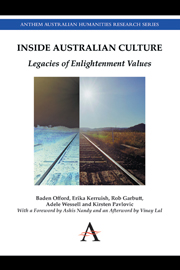Book contents
- Frontmatter
- Contents
- Foreword. Is Australia a Victim of the Ethical Limits of the Enlightenment? A Modest Foreword for an Immodest Venture
- Preface and Acknowledgements
- Chapter One Introduction
- Part One Getting Inside Australian Public Culture
- Part Two Three Moments of the Enlightenment
- Part Three Working with the Necessary Other
- Chapter Seven The Closing of Public Culture to Communal Difference
- Afterword. The Emptiness Within and Without: Enlightenment Australia and Its Demons
- Notes
- Index
Chapter Seven - The Closing of Public Culture to Communal Difference
from Part Three - Working with the Necessary Other
Published online by Cambridge University Press: 05 October 2014
- Frontmatter
- Contents
- Foreword. Is Australia a Victim of the Ethical Limits of the Enlightenment? A Modest Foreword for an Immodest Venture
- Preface and Acknowledgements
- Chapter One Introduction
- Part One Getting Inside Australian Public Culture
- Part Two Three Moments of the Enlightenment
- Part Three Working with the Necessary Other
- Chapter Seven The Closing of Public Culture to Communal Difference
- Afterword. The Emptiness Within and Without: Enlightenment Australia and Its Demons
- Notes
- Index
Summary
As it's configured within the environment of those parameters, the public sphere is seen as almost the only sphere that's legitimate and we can only come to the public sphere as single individuals and citizens, not as any other kind of category.
Interview with Ashis Nandy, 6 December 2007Public culture is composed of diverse elements – parliamentary committees, law courts, the media, and the unruly public sphere itself. These varied components are connected by discourses and practices that reach across specific institutions and spaces. Each of our case studies has examined an episode that places questions about the relationship between race and Australian citizenship to the fore of public discourse. The debate about the belonging of non-Anglo Australians occurred, more often than not, in cultural rather than biological terms. Considering how matters of race are reinscribed as questions of culture, in this chapter we examine the relationship between communal traditions, Enlightenment principles and the capacity to dissent. At the time of each case study, there was an opportunity for diverse cultural traditions to be legitimised as presences in the Australian public culture and the nation. And at each moment, Australian public life failed to make room for different communal, cultural traditions. These case studies – or moments – then, are examples of how ‘the concept of Enlightenment […] has failed whenever confronted by the concrete reality of difference (exemplified nowadays by the presence of the Indigenous Australian, by the African migrant, the refugees, and their like).’
- Type
- Chapter
- Information
- Inside Australian CultureLegacies of Enlightenment Values, pp. 97 - 114Publisher: Anthem PressPrint publication year: 2014



